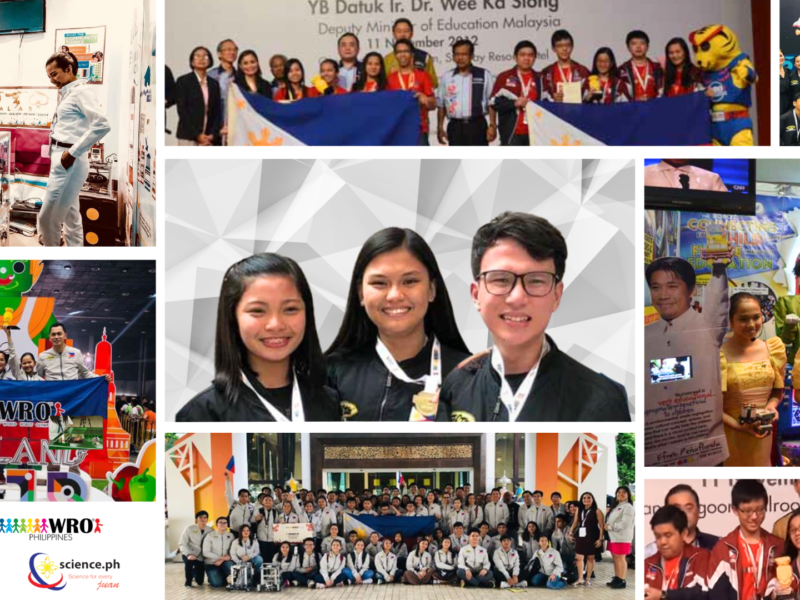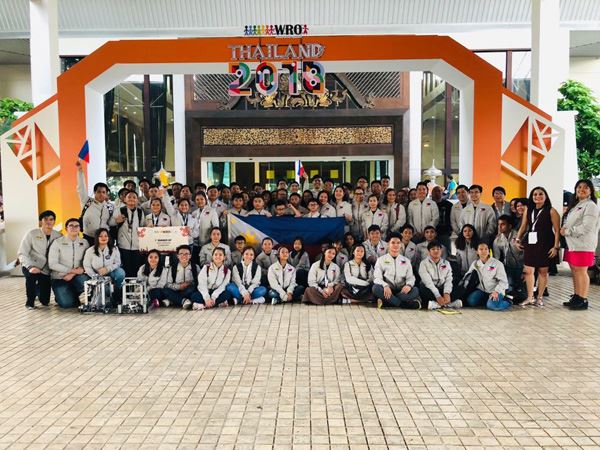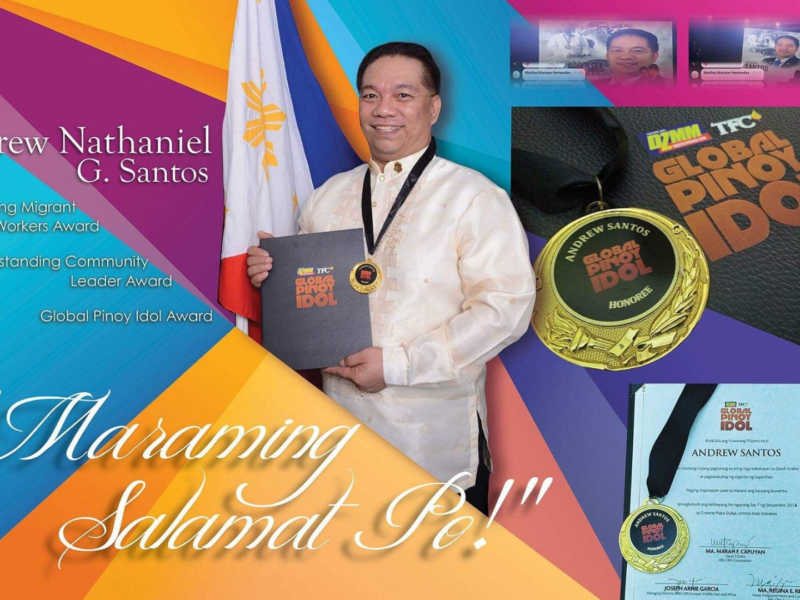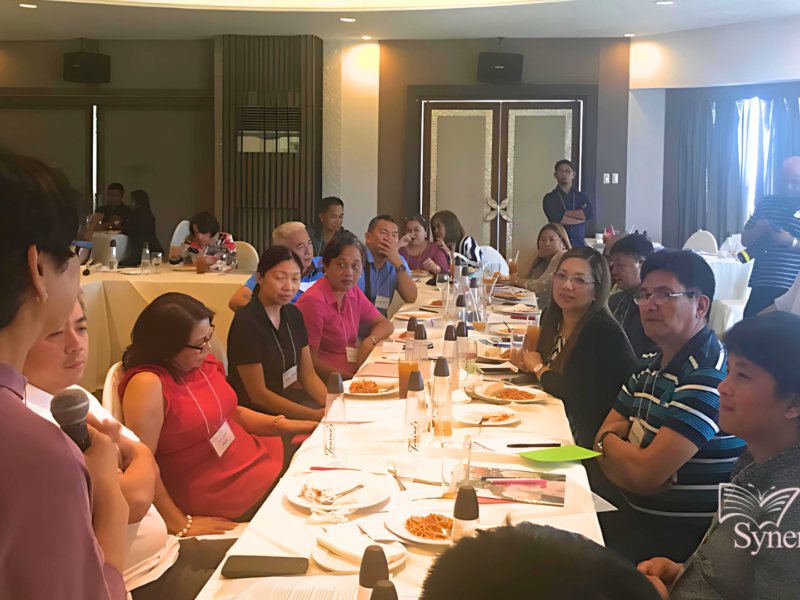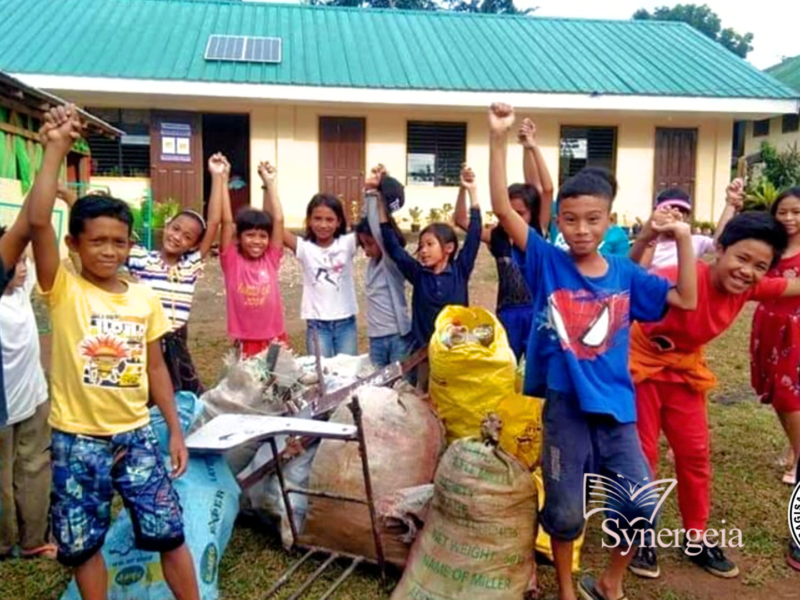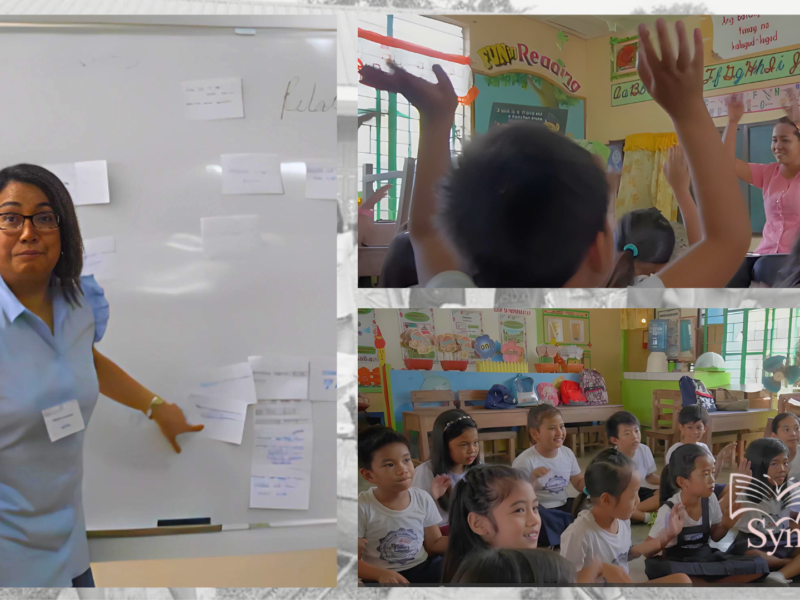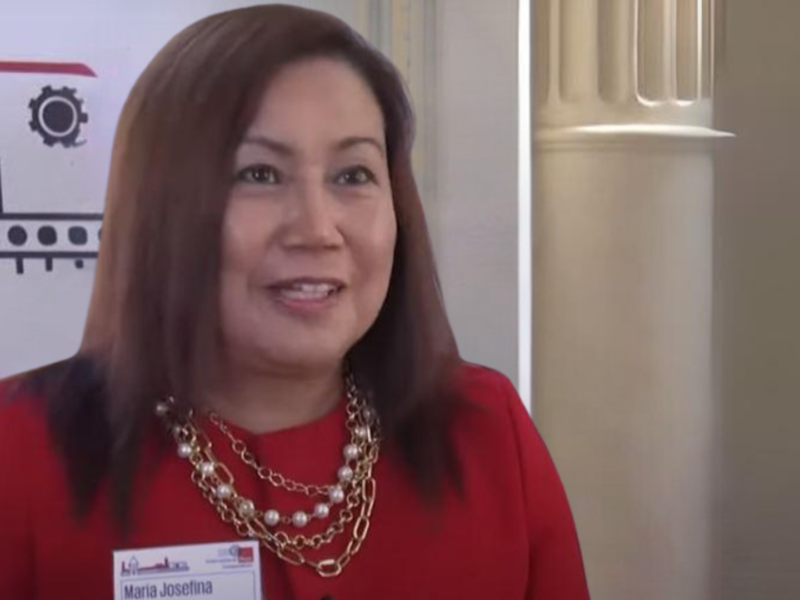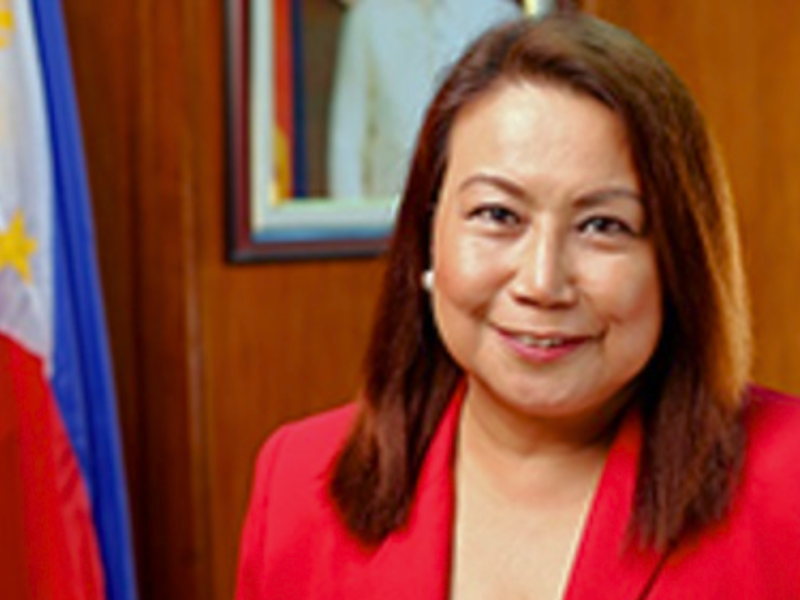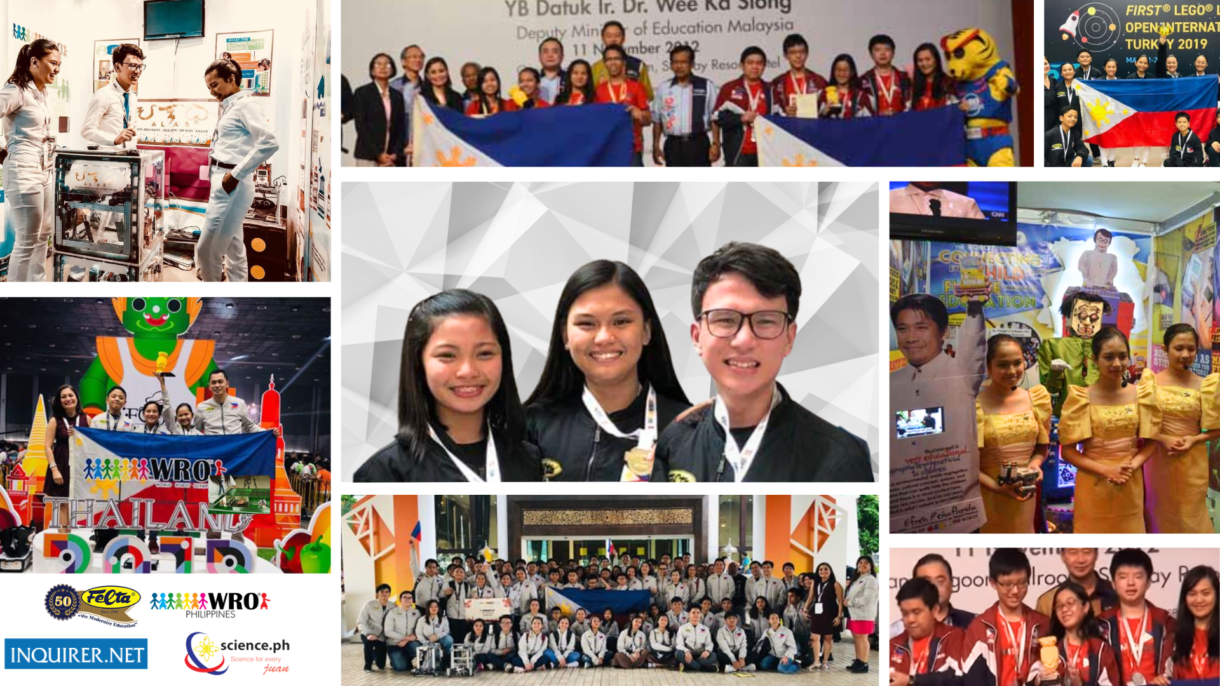
Bulacan’s Dr. Yanga’s Colleges wins Gold at World Robot Olympiad in Denmark
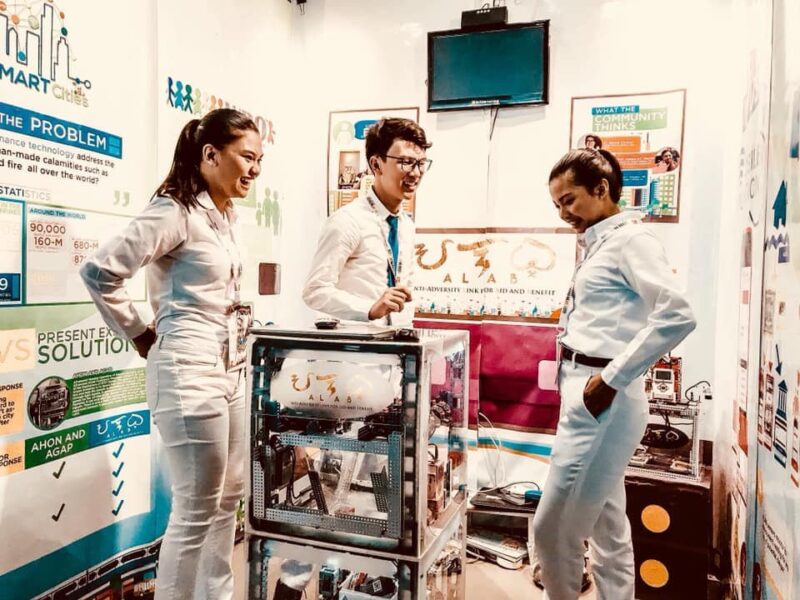
By Angie Quadra-Balibay, August 22, 2019
Dr. Yanga’s Colleges Inc. (DYCI) from Bocaue, Bulacan won Gold at the World Robot Olympiad Friendship Invitational (WROFIT) 2019 held in Aarhus, Denmark.
Team DYCI NOVUS, a member of the Philippine Robotics National Team, won Gold in the Senior – Open (Creative) Category with the project SMART Governance or ALAB (Anti-Adversity Link for Aid and Benefit).
The ALAB is an efficient, innovative and organized way of providing aid in addressing natural and man-made calamities all over the world through smart governance Technology.
The winning Robotics Team include Naiah Mendoza, Jaren Perez, and Doneth Dela Rama, with head Coach Beryl Jhan Cruz and Assistant coach Anne Raz. DYCI President, Dr. Michael Yanga, accompanied the team.
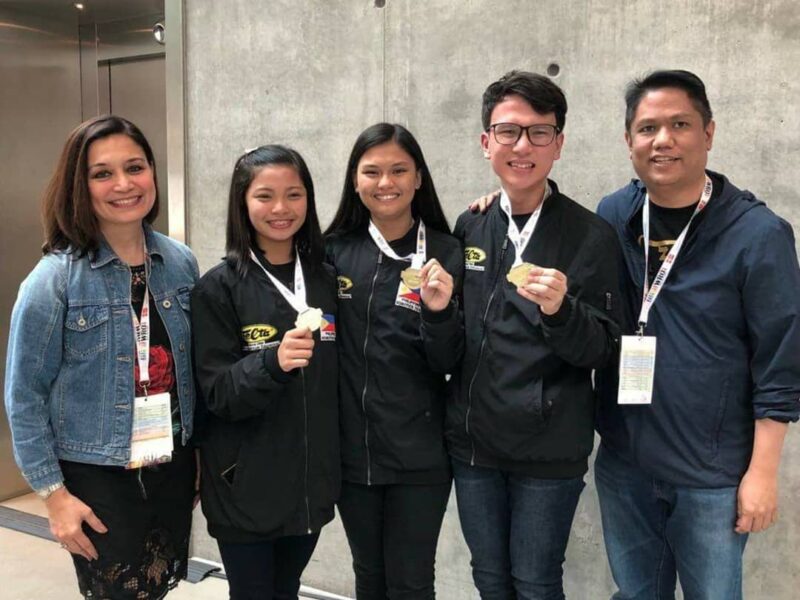
The Philippine Robotics National Team delegation, composed of students from DYCI, San Beda College of Alabang, JJAL Learning Center in Olongapo, and De La Salle Santiago Zobel (DLSZ), competed among 150 teams from 33 countries which participated in the WROFIT 2019 held from August 1-4, 2019 in Aarhus University.
Mylene Abiva, President/ CEO of FELTA Multi-Media Inc. which led the Philippine delegation spoke about the value of the competition saying, “The complexity, technology has evolved. Even at the at an early age, the concepts of Artificial intelligence and machine learning with technology will be adapted in our everyday life.”
The Philippine Robotics National Team will next compete in the World Robot Olympiad Finals in Gyor, Hungary on November 8-10, 2019.
Dr. Yanga’s Colleges Inc. of the Philippine Robotics National Team has won several medals in various international tournaments including a Gold in Turkey and Special Awards in Houston.
Source: Good News Pilipinas
Philippine Robotics NATIONAL Team won SILVER at World Robot Olympiad 2018
The World Robot Olympiad Finals 2018 was held in Chiang Mai, Thailand with 63 countries or 486 teams participated and with over 26,000 teams participated in their respective country nationals. The most prestigious and largest Robotics competition in the world.The theme for 2018 is Food Matters.
Philippine Robotics NATIONAL Team had the largest delegation in 18 years ! World class performance as 17th place in Robot Soccer by CLARET School of Quezon City and Dr. Yanga’s Colleges Inc. won the SILVER Medal for Open/ Creative Category Elementary Level for their PROJECT FEED . As part of the cultural and heritage tour, the Philippine Robotics National Team visited Wat Sadouk temple and other places of interest in Chiang Mai.
World Robot Advisory Committee presented a Certificate of Appreciation to FELTA Multi Media Inc. and City of Lapu Lapu during the National Organizer VIP Dinner for the successful and momentous organization of the World Robot Olympiad Friendship Invitational 2018 in Lapu Lapu City, Cebu, Philippines.
The Vice President of the Philippines , VP LENI ROBREDO, joined the Philippine Robotics National Team at Suvarnabhumi Airport from Bangkok to Manila via our official carrier Philippine Airlines.
FELTA Multi Media Inc. continues to bring out the BEST in every student! Robotics Excellence and World Class!
Source: FELTA
Robot created by PH students to detect unsafe meat wins 3rd prize in US expo
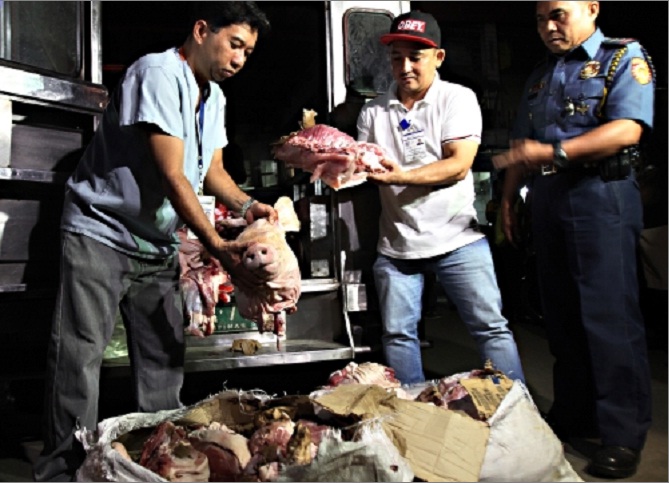
MANILA, Philippines — An “anti-botcha” robot invented by a team of Bulacan high school students got the nod of international judges and won a prize at the recently concluded For Inspiration and Recognition of Science and Technology (FIRST) Lego League (FLL) World Festival in Missouri.
The team from Dr. Yanga’s Colleges Inc. (DYCI) won 3rd Best Presentation for introducing their robot MAGIS Version 2 (Meat’s Anti-Germs and Infection Solution) at the FLL tournament held in St. Louis, Missouri, in the United States from April 25 to 28.
Team DYCI includes Team Captain Gladys Leigh Malana and members Tricia Carmela Santos, Ramikert del Prado, Michelle Arcanar, Kate dela Cruz, Lady Alein Goleng, Jules Martin Agsaoay, Jonathan Alejandro, Dave Adrian Bien, and Tim Jhalmar Fabillon.
The robot, made of stainless steel, aluminum and acrylic plastic, has color and temperature sensors that could detect unsafe meat.
Cuts the robot finds to have higher-than-normal temperature and unhealthy color would be tagged unsafe, according to the Department of Science and Technology’s Science Education Institute (DOST-SEI).
“We congratulate our Philippine Robotics team for again bringing honor in the bigger stage and we hope that this victory will inspire more young students to develop their skills in robotics and hopefully start
a trend in making it big in the FLL in the coming years,” she said.
The DYCI team’s participation in FLL was the first time a Philippine team participated in the robotics tilt.
More than 70 student teams from around the world took part in the competition, which challenged students to invent robots around the theme “Food Factor,” or technology that could help keep food safe for human consumption.
“I’m very proud. It’s the country’s first time to join the contest and we placed 3rd in Best Presentation. They did a good job. Not all first-timers win in an international competition,” said Beryl Jhan Cruz, one of the team’s coaches, said in a statement.
The team hopes the National Meat Inspection Service would adopt their technology for use in detecting “botcha,” (also called double dead), which is meat taken from the carcass of animals that died of diseases.
FLL handed out awards in 15 categories, among them the best teams in research, innovation, mechanical design, robot performance and presentation, where DYCI was declared one of three winners. The Philippine took home a trophy as their prize.
Overall FLL team winners are Falcons Japan (1st prize), Blue Gear Ticks of the US (2nd prize) and NXTremers from India (3rd place).
SEI Director Filma Brawner said Team DYCI’s win showed that Filipino students have the skills and talent to go head to head with students from other countries in robot design.
“With this victory, we will continue to support endeavours that will develop a pool of local robotics experts who will soon lead the country in providing solutions to problems related to science and technology,” Brawner said in a statement on Thursday.
FIRST is a US-based organization that aims to bring science, engineering and technology to students from around the world through competitions and mentoring. The group was founded in 1989 by American inventor and entrepreneur Dean Kamen, who invented the automated transporter Segway.
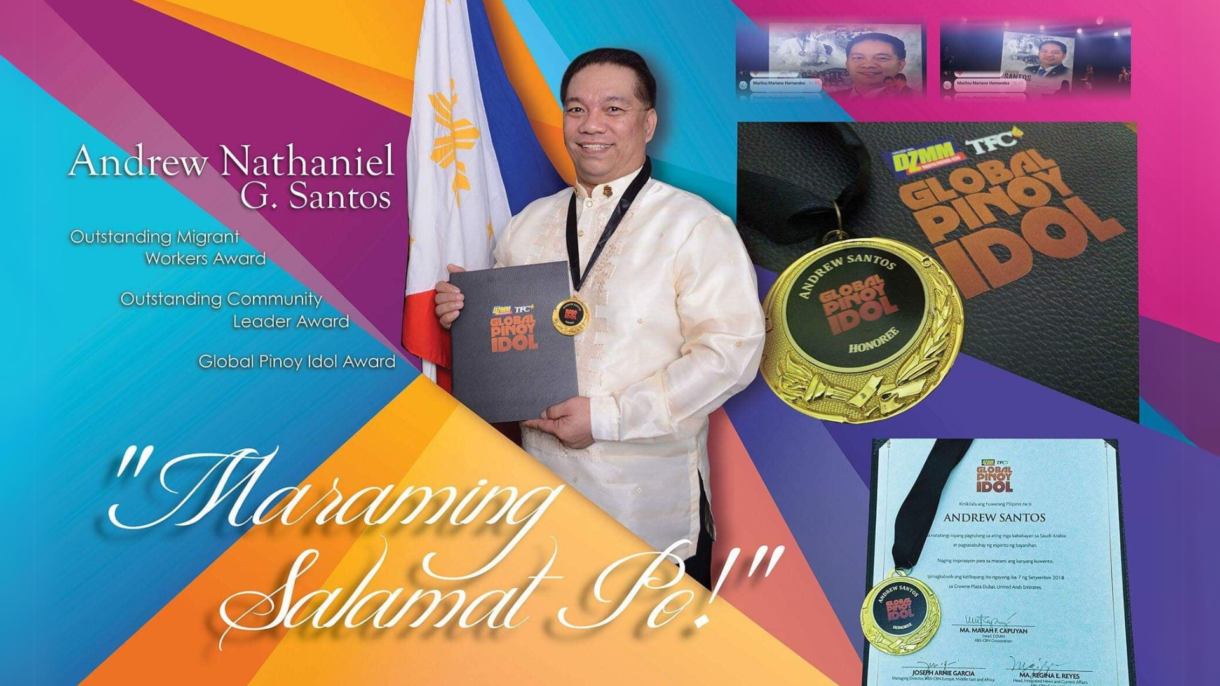
Global Pinoy Idol from Hagonoy, Bulacan
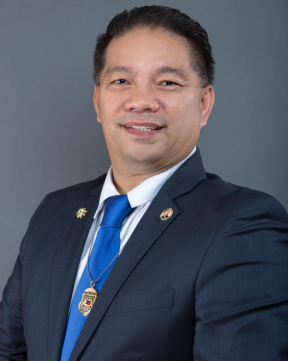
Andrew Nathaniel G. Santos
Planning Head
Group Five Pipe Saudi
Dammam, Kingdom of Saudi Arabia
Illustrious shepherd of migrants goes beyond boundaries, extends help
A GRACIOUS and compassionate Bulakenyo, Andrew Nathaniel Santos is one of the first Filipinos who was presented the Outstanding Migrant Workers Award in 2014 by the Philippine Embassy in Riyadh. He is the first Outstanding Alumnus in the field of Information Technology (IT) of his alma mater La Consolacion University Philippines in Malolos City, Bulacan. He is the recipient of the Outstanding Community Leader in KSA by the Filipino Community Leaders and the Global Pinoy Idol given by ABS-CBN TFC-DZMM in Dubai.
The 55-year-old native of Guiguinto sits on the School Governing Board for 2-terms of International Philippine School in Al Khobar. He holds the rare privilege of holding highest positions in Filipino community organizations in the Eastern Province of the Kingdom of Saudi Arabia. He served, among others, as President of OFW Congress – Eastern Province KSA, Dammam Black Gold Sapatilha Eagles Club, K Fitness Club and Desert Smashers Club. He was International Director of Association of Chiefs of Police in the Philippines, Inc., Middle Eastern Makabayan Chapter, Regional Overseas Vice Chairman of Anti Organized Crime and Corruption Intelligence Group and Chapter Pursuivant of Knights of Rizal – EPCC Chapter. He was Vice President of Harmonicans Choir.
At work, he was promoted from IT Manager to Planning Head of Group Five Pipe Saudi. With this promotion, he holds the record as the only Filipino manager in one of the leading manufacturing companies of large diameter spiral pipes in the Arab kingdom. While he has done great things as a community servant, he still seeks how he can extend his support especially to our fellow OFW in distress. He organized various community and environmental awareness programs which the host country appreciated much. He was leading in the organizing of the Kalayaan celebrations in the Eastern Region and during the visits of the Philippine Presidents, H.E. Rodrigo R. Duterte and H.E. Ferdinand R. Marcos, Jr. in organizing the delegations of Community leaders to attend in the Meet and Greet in Riyadh, KSA.
He took his elementary education from San Agustin Institute of Technology in Valencia City where he graduated in 1980. He graduated as an Exemplary Student in 1986 from St. Anne’s Catholic High School in Hagonoy, Bulacan. He was an Outstanding Computer Science Student and recipient of Service Award when he graduated in 1991 for his bachelor’s degree from La Consolacion University Philippines, in Malolos City. He obtained his Master of Arts in Education from Adamson University in 1998 and Masteral Units in Master of Business Administration in La Consolacion University Philippines and Masters in Information Networks in Polytechnic University of the Philippines.
He was 20 years old when he had his first paying job. He recalls, “During my college days, I worked as data encoder in the university and so I was able to sustain my education and helped also my three brothers in completing their baccalaureate degrees.”
In 1991, he married Vilma Gonzalo Mendoza. Their marriage is blessed with six children. The eldest, 32-year-old Kristine Andrea, a graduate of BSFM at Far Eastern University, works as a call center supervisor. The second child, 29-year-old Katrina Ann, who earned her bachelor’s degree in Math major in Computer Science from Bulacan State University, is a credit analyst in BPI Main office in Makati. The third child, Karen Angelica is a graduating BSIM student at BSU. The other children are Engr. Karl Andrei, aged 25; Karisa Alyanna, aged 23, a 3rd Year Tourism Management Student in National University Baliwag; and, Kiana Amirah, aged 9.
Prior to his departure overseas, he was the Dean of the College of Computer Science and Engineering at La Consolacion University Philippines. He said, “I requested the University President, Sr. Carmel Ma. Catan, OSA to allow me to go to KSA for a two-year sabbatical leave so I can expose myself to the industry or in the business sectors and in my return, I will be developing a comprehensive curriculum in the college of Computer Science and Engineering. That was the plan that time.”
Fascinated. The first time he came to Dammam, he was impressed with the city’s development. “I was fascinated with the infrastructures and the way things are implemented. I feel that it is more peaceful and enjoyable to stay here. I still appreciate the host country allowing expatriates to work for a living, although there are new laws and regulations now, but still, it is favorable to work here. I find many Saudis as friendly, professionals and caring people.”
He said, “I took note of the increasing needs of my family. As a father of six children, it was very difficult for me to sustain their education. I was forced by the situation to stay as an OFW. Happily, I was blessed that I was able to bring my family with me here in KSA and we were together. But this is not the case of many.”
He has been abroad for the last 22 years. He further said, “After serving for three years from August 2002 to September 2005 as System Analyst in Gulf Agency Company in Dammam, I found myself, that it was then the needs of my family should be on top of my priorities. I decided to continue my service in the kingdom until today.”
Modern factory. The Group Five Pipe Saudi which operates under Abdel Hadi Al Qahtani and Brothers in Dammam is a modern factory that supplies Saudi Arabia and the neighboring Middle East markets with big-diameter, high-quality carbon steel pipes. These pipes are used in the sectors of oil and gas, water and construction.
Andrew was involved in creating and developing an in-house information system known as the Pipe Tracking System. It was a very significant project because it serves as the main application that tracks the status of the project and it will provide a real-time update and needed reports. “This was during the time that I was the IT Manager of the company. Being the Planning Head, I am responsible for the production planning and monitoring of various multi-billion projects in Saudi Aramco and SWCC in the KSA.”
Lessons learned. According to him, being an OFW is not forever. “It is a temporary journey in your life that you try to get out in your local community to look for a greener pasture outside the country. Value your money and time. Educate your family in the Philippines that the money that you earn is not easy. Encourage your relatives to be entrepreneurs so that the daily needs may be provided by the small business you put in. This will make them busy and productive rather than waiting for your remittances. Start investing for your health and future. Look for good investment programs that will allow your money to grow big.
He adds, “Always communicate with your family, relatives and friends. Nowadays, it is easy to keep in touch through social media. This is for you not to dislocate and be forgotten by the people whom you know. It will make you easy to reintegrate one day. Lack of communication makes relationships with your spouse or children difficult and it makes you alienated from them. Sometimes, it leads to broken and problematic family relationships. So be careful, always go back to your decision why you have to leave them.”
“As an OFW, look for partners of the same interest as yours, so when you come home, it will be easy to put up business. Do linkages and partnerships. Always plan and see to it that it is achievable. Your plan will make your journey in life more worthwhile and no regrets.”
Passion to serve. “When I arrived here in August 2002, after a month I was able to get involved in the Filipino Community. I was appointed to handle a sports tournament (Basketball League) among Filipinos here in Dammam and Al Khobar. My training and experience in the Philippines handling a regional meet paid off and I was able to share it to many of the OFWs.”
“I joined OFW Congress-EP and during the election that year. I was elected as the Secretary General and that started my life as a servant to the OFW. As president of this organization, I was able to concretize my passion to help, assist, educate and serve my fellow kababayan creating an environment of unity and collaborations about various organizations.”
“I have made many accomplishments in terms of helping my fellow distressed OFWs, especially during the pandemic. Truly as they said Bagong Bayani I feel useful to my country as we are the one who help to fuel our economy.”
He has been commended for his consistent passion to serve, share and love to people. “I am a type of a leader who does not need an appreciation or accolade. It is enough for me to make other people happy and succeed.”
“I wanted to take challenges and opportunities and never give up. Many events in life had passed. Many successes are being praised. For me, if I will do it again, I will make sure that it is in the next level. I feel I still have a lot of things to do. God made me as an instrument of his greatness and blessings. I will continue and I will never stop until the last moment of my life. I want to be remembered for having a happy and contended life, leaving a legacy that anyone would emulate and replicate.”
Source: Andrew Nathaniel Santos/ ABS-CBN TFC Global Pinoy Idol
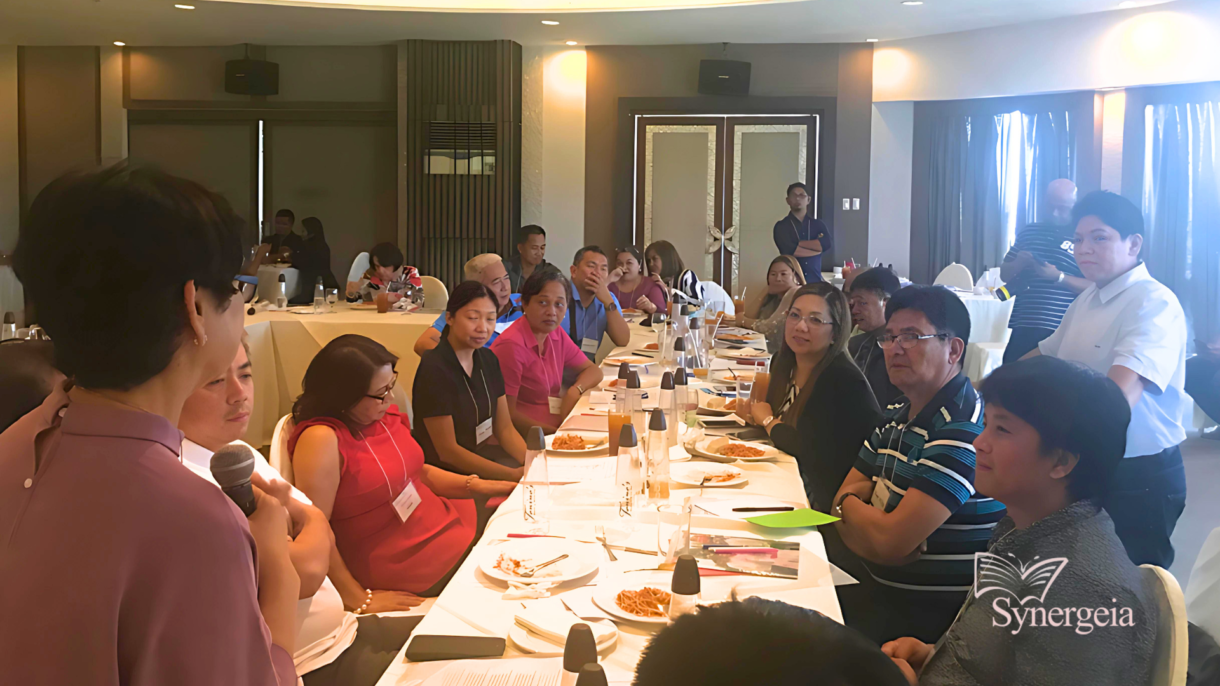
Synergeia: Growing Education in Mindanao
What a mover Siayan Mayor Flora Villarosa is! With the support of EdGE, Mayor Villarosa invited all the Mayors and Local School Boards of Zamboanga del Norte to a regional meeting in Dipolog City to share best practices in education governance and and to cohort more education champions in the Zamboanga Peninsula.
The local chief executives were presented with data on the status of education in their localities, which was followed by a discussion on possible causes for the poor performance of students. A “shock and awe” approach was needed to make the LCEs and LSBs realize that improving the quality of education is a shared responsibility. As leaders in the community, they have a huge role in setting education priorities. But their leadership and support are also necessary so that the entire community can be mobilized to work for solutions to problems impeding the growth of education.
When asked to prioritize their concerns, poverty alleviation was their most frequent response. Education did not seem to figure out among their LGUs’ top priorities. To this, Ma’am Nene Guevara, Synergeia CEO, shared the result of studies that showed poverty has become intergenerational because children from poor families are unable to study or complete elementary or high school. Giving children access to education gives them and their families opportunities for a better life. This was an eye-opener for the Mayors and LSB members.
The regional meeting also gave the Mayors the opportunity to listen to and be inspired by Valenzuela Mayor Rex Gatchalian and his successful 360 Degree Education Program of Valenzuela City. Mayor Rex presented the components and results of the Valenzuela program, a flagship education initiative which EdGE supports. Mayor Rex was a perfect example to the Mayors of a local chief executive who takes the driver’s seat in education in partnership with DepEd and other community stakeholders.
They were also fortunate to listen to Former Governor Josie dela Cruz, currently Synergeia mentor, sharing the education story of Bulacan back when she was still its governor. Bulacan’s education program, among the pioneers under the Synergeia wing, was also a success story.
At the end of the day, the Mayors gave their full commitment to prioritize education and undertake follow-up activities like conducting their own education summits to identify education gaps and proposed solutions, and re-inventing and expanding their Local School Boards. It was indeed a good day for education governance.
Source: Synergeia

SYNERGEIA AND TERESA WORK IT OUT! with Former Bulacan Gov. and Synergeia Mentor, Josie Dela Cruz
With the New Year comes new beginnings and for the Municipality of Teresa, 2018 marks the beginning of a newfound commitment to education. On the 23rd of January, Synergeia and the Municipality of Teresa officially began its education partnership with the town’s first ever Education Summit.
Everyone was abuzz with excitement and eagerness. The participants yelled the summit’s title “We Can Work It Out” like a battle cry to kick-off the day’s program of activities. Mayor Raul Palino was inspiring yet firm in his remarks. To everyone in the room — to the school officials and teachers, students, parents, implementers of the 4Ps program, private sector, and local government officials, he posed this challenge: “May gagawin po tayo…Ang ating layunin ay sama-samang makatulong sa mga bata. Papaano natin itataas ang antas ng karunungan sa Teresa?”
Synergeia Mentor, Former Governor Josie dela Cruz, discussed School Governing Councils – – how they are created, who can be SGC members, their functions and how they differ from Parent-Teachers’ Associations. She highlighted their important role in the formulation of school improvement plans after finding out that many schools in Teresa did not have SGCs at all, or if they did, these were not functional or active in school policy making and planning. The SGC is the vehicle to involve members of the entire community who might have a stake in the improvement of every child’s education. As F/Gov Josie so aptly stated, “Ang edukasyon ng kabataan ay pakialam nating lahat…Pagkatapos nitong summit na ito, sana magbubuo po tayong lahat ng School Governing Councils sa ating mga paaralan.”
The two break-out groups facilitated by F/Gov Josie and Ma’am Nene were interactive, fun, and instructional at the same time. There were follow-through modules on identifying SGC circles of influence, how to make one attend an SGC meeting and what could be ground rules an SGC must observe. The participants worked on a group puzzle that quizzed them on historical facts about the Philippines and in the process, they learned about cooperation and working as one team. They next dove right into capacity-building activities that focused on setting attainable goals, translating goals into tasks, and differentiating between inputs, outputs, and outcomes. These skills are instrumental in building and fostering a successful SGC.
The participants, shown the National Achievement Test scores of Teresa schools, expressed concern at the declining trend of scores over the past few years. Participants, including young students, had stories to tell on possible reasons for this drop such as the sudden change in curriculum, the focus on mother tongue, parents who are unable to read themselves, newbie teachers assigned in the lower grades, students distracted with games, and so on. The bottom line, however, was everyone agreed that there was much work to be done.
To cap the day’s workshop, the participants were asked to prepare a simple action plan that identifies their desired goals and tasks. The teachers want to improve the reading and math competencies of schoolchildren. The parents look forward to a training on parenting skills. DepEd Schools Division Superintendent, Dr. Meliton Zurbano, identified reading, numeracy and writing as priorities. Teresa Marble, the partner-private corporation of Teresa in its education program, promised to support and monitor the development of SGCs, the remedial reading training of teachers and parenting workshop.
After hearing the participants, we know that there is so much hope and promise that Teresa’s education program will succeed. Ma’am Nene promised Synergeia’s full support and commitment. Her parting note – “Ang programa ng Synergeia ay ang inyong edukasyon…”
Source: Synergeia
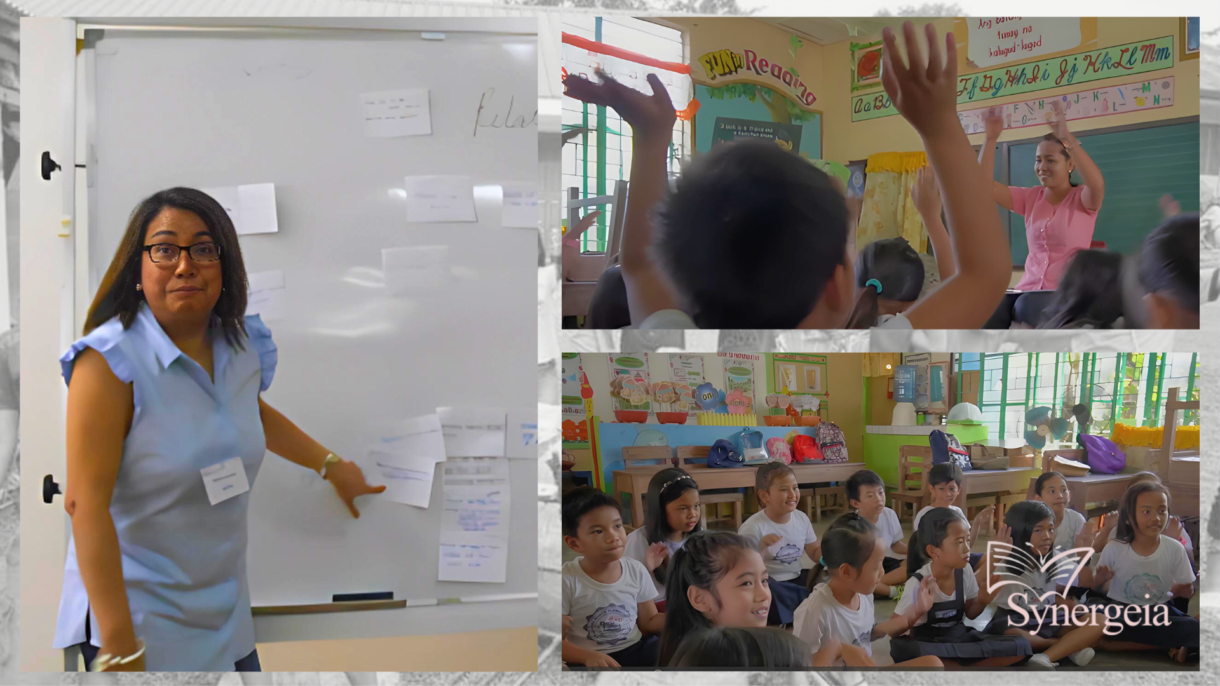
Synergeia in Argao, Cebu
By: Carmela Kris Armilla, Program Officer, Synergeia Foundation
“Before I retire, I will contribute what I can to make our SGC functional and active,” declared Juan Rivera Jr. with resolve after attending the SGC Workshop. Mr. Rivera is the 61-year-old principal of Apo Elementary School in Argao. With four years left in his term, Principal Rivera is inspired to exhaust all means to improve the school he serves. He sees the SGC’s role in making this possible.
He was one of around 170 School Governing Council (SGC) members from Argao, San Fernando and Santander who attended the two-day workshop “We Can Work It Out: Making Our SGCs Work” held at Montebello Hotel, Cebu City last July 25-26, 2017.
Having undergone Level 1 training, our SGCs this time were given Level 2 training “with a little bit of 3.” The “little bit” part aimed to introduce some Level 3 modules to our participants.
The first plenary focused on a review of the role of the SGC, its responsibilities, how it is formed and why it is different from the Parents-Teachers Association. When the participants were divided into clusters, they went through an appreciative inquiry exercise where they shared stories behind the performance of their students in terms of their NAT scores and the cohort survival rates. Realizing where the students stand had set the tone for the SGCs to be introspective on how they can play more effective roles in improving basic education.
Their first group activity was solving a puzzle. It was meant to test how well they work with others. After the group activity, one participant realized the essence of “making collaborative ideas.” Another said that when faced with limited resources, thinking “outside the box” was key. Gov. Josie dela Cruz, former Governor of Bulacan and Synergeia mentor, emphasized the importance of inclusivity when working in the SGC, stating that exclusivity might limit opportunities for development.


SGC members are shown trying to solve the puzzle.
Using a “satisfaction meter,” the SGCs then went on to assess their performance on five aspects – their ability to hold regular meetings and set agenda, election of officers, agreeing on by-laws, engagement of the community and formulation of school policies. Through role-plays and cluster discussions, the participants learned more about project planning, translating goals into tasks, financing and conflict resolution. One policy that they think should be established is the roles of parents and the school principal and teachers in the education of the children. They agree on the important role of parents because they are the teachers of students at home.

Synergeia Mentor Gov. Josie facilitates the discussion on activities and tasks to implement the goals of the SGC.
Creative fund-raising activities for the SGC were also discussed. Gov. Josie shared a snippet of wisdom – that “all funding begin with a good project.” Some barangays shared that activities such as Gulayan sa Paaralan, Prince and Princess contest, and sewing projects have financially supported their respective schools and SGCs.
The concepts of input, output and outcomes, the steps in designing process flows, and action planning and evaluation were introduced to the participants. These are the Level 3 modules that have been included in this workshop. The participants learned new tools such as the process flow and action plan matrix that will help them identify tasks more systematically and in specific terms including setting deadlines to accomplish these tasks. They also learned about looking beyond outputs and seeing that outcomes of their projects are what impact the lives of students and the community as a whole.
At the end of the workshop, our SGC participants agreed that the collaboration of parents, school and barangay leaders is the linchpin towards a holistic and secure quality education for students in their respective communities. They gave their thanks and shared the common goal they wish to accomplish. “Our goal is to make our SGCs functional in their respective areas,” shared Ms. Rosalina M. Fuentes, principal of Balasa Elementary School.
Source: Synergeia

Philpost Modern History with First Female PMG
History
The Philippine postal system has a history spanning over 250 years. The first post office was established in the city of Manila in 1767. It was organized under a new postal district of Spain in 1779, encompassing Manila and the entire Philippine archipelago. In 1783, the postal service was organized in the Philippines-overseas mail from the Philippines was conveyed to Europe by Spanish ships via eastbound routes through Mexico. Later on, the postal district was re-established on December 5, 1837. After a year, Manila became known as a leading center of postal services within Asia. Spain joined the Universal Postal Union in 1875, which was announced in the Philippines two years later.
During the Philippine Revolution, President Emilio Aguinaldo ordered the establishment of a postal service to provide postal services to Filipinos during that time. On September 5, 1902, it was organized as a bureau under the Department of Trade (currently known as Department of Trade and Industry) by virtue of Act No. 426, which was passed by the Philippine Commission. The Philippines finally joined the Universal Postal Union in January 1, 1922 as a sovereign entity.
The Manila Central Post Office Building, the center of the Philippine postal services and the headquarters of then-Bureau of Posts, was completed in 1926. It was destroyed during World War II (1945) but was rebuilt in 1946, after the war.
The Manila Central Post Office located at LiwasangBonifacio is a neo-classical building designed by two American architects and a Filipino namely: Ralph Doane, Tomas Mapua, and Juan Marcos de Guzman Arellano. The Post Office Building was considered as the grandest building during its time, and is now considered as one of the dominating landmarks in Metro Manila.
With the overhaul of the Philippine bureaucracy in 1987, the Bureau of Post was renamed the Postal Service Office (PSO) by the virtue of Executive Order No. 125 issued by then-President Corazon Aquino on April 13, 1987. It was also that order which placed PSO under the Department of Transportation and Communications (DOTC). On April 2, 1992, by virtue of the Republic Act No.7354 issued by then-President Fidel V. Ramos, PSO became a government owned and controlled corporation named as the Philippine Postal Corporation of more commonly known today as PHLPost.
Milestones
- 1767-The first post office was established in the City of Manila.
- 1926-The Manila Central Post Office was built in its present neo-classical architecture.
- 1942-During the Japanese occupation, the then- Bureau of Posts was reopened, although the letters were censored.
1946-The Manila Central Post Office was rebuilt after World War II. - 1948-The postal service and telecommunication facilities in the Philippines were considered the most modern at that timein Asia. For example, the airmail service was inaugurated in our country ahead of any other countries in Asia.
- 1992-The Philippine Postal Corporation (PHLPost), a government-owned and controlled corporation responsible for providing postal services in the Philippines, was created by virtue of Republic Act No. 7354, otherwise known as the Postal Service Act of 1992.
- 2000-The improved Central Mail Exchange System (CMEC) is now capable of computerizing and modernizing the sorting of all incoming and outgoing mail matters handled by PHLPost.
- 2004-PHLPost was placed under the Commission on Information and Communications Technology per Executive Order 269.
- 2011-PHLPost was placed under the Office of the President per Executive Order 47, signed by President Benigno Aquino III. The President also appointed former Bulacan governor Ma. Josefina Dela Cruz as the new Postmaster General, the first woman to hold this position in t he history of the Philippine Postal Service.
- 2012-Under the able leadership of the first female Postmaster General and Chief Executive Officer Ma. Josefina M. Dela Cruz and PHLPost Chairman of the Board Cesar N. Sarino, the postal service remains committed to serve the public with honesty, integrity and quality of service.
PHLPost Modern History
2011
- Achieved a financial turnaround, and since then, the corporation reported an increasing trend in its net income.
- Underwent rebranding, from Philpost to a new and improved PHLPost, with the tagline: You send. We Deliver.
- Prioritized reconciliation efforts with the GSIS to restore the active membership status of affected employees all over the country.
- Forged partnership with private companies and organizations to scale-up operations, increase revenue streams, and link communities for social inclusion.
- Strengthened government to government relations to bring services closer to the Filipinos.
2012
- Implemented the Rationalization Plan for a sustainable, market-driven, and customer-centric organization.
- Remitted PhP10 million worth of dividend to the National Government out of its 2011 income for the first time since its incorporation in 1992.
- Ventured into logistics and warehousing business, with a three year refleeting program to ensure efficient delivery of communications and goods up to the last mile.
- Migrated from paper-based to electronic postal money order; from manual and mechanical units to use of networked digital postage meter machines.
- Expanded the postal network as major mall chains open postal counters, while private individuals become PHLPost’s partner in postal stations.
2013
- Received Comelec commendation for 100% efficiency in the delivery of election paraphernalia.
- PHLPost garnered a 93.97% rating in its performance agreement with the Governance Commission for GOCCs.
- Introduced modern printing technology to renew interest in philately.
- Institutionalized a postal awareness campaign, Sulat Mulat, to revive the art of letter writing.
- Supported the continuing education of employees through an educational assistance program for masteral and specialized courses.
2014
- Achieved global recognition after winning the World Mail Awards 2014 for People Management held in Germany, and a finalist in Post Expo Technology Award 2014 in Sweden.
- Migrated from issuing laminated card type to a new Postal ID made of PVC with multiple security features.
- Opened the first Government Procurement Service Hub in CDO.
- Introduced the Selfie Stamps
- PMG Josie Dela Cruz became the first Asian official appointed in the international payment gateway, Eurogiro Board.
2015
- Implemented the Domestic Mails Tracking System for real time and complete events tracking.
- Inaugurated the first temperature-controlled warehouse.
- Singing Karteros became a hit.
- Deputized as a collecting agent of Bureau of Customs to expedite delivery of mails and parcels.
Source: PHLPost
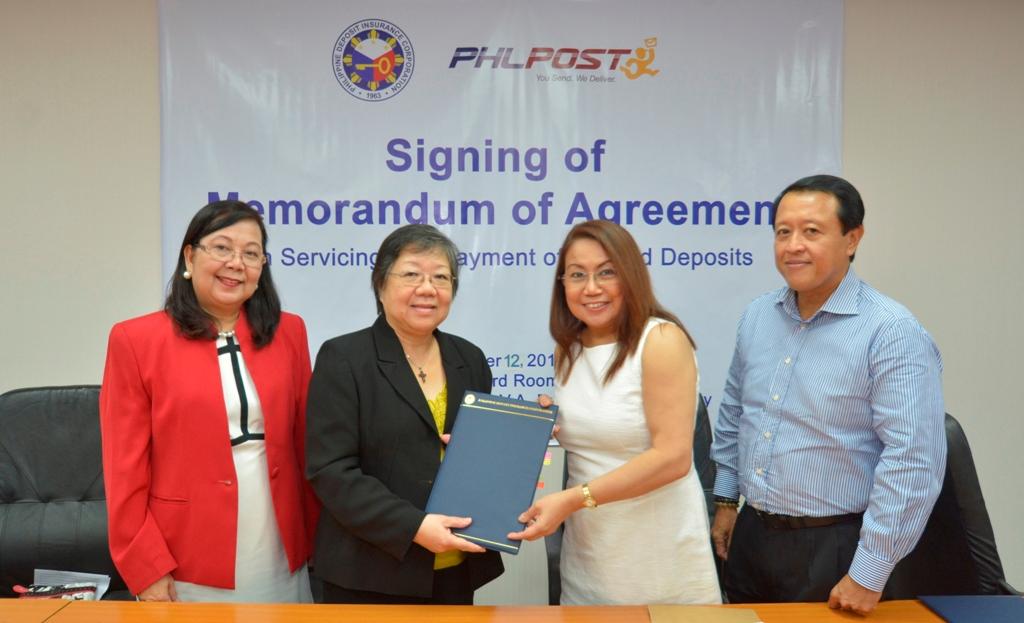
PDIC, PhilPost renew agreement on deposit insurance payments
Stronger partnership for deposit insurance payment. Philippine Deposit Insurance Corporation (PDIC) President Cristina Que Orbeta and Philippine Postal Corporation (PhilPost) Postmaster General and Chief Executive Officer Ma. Josefina M. Dela Cruz agreed to confirm the PDIC-PhilPost partnership for servicing deposit insurance payments of depositors with account balances of up to Php100,000 through a Memorandum of Agreement (MOA) signed on October 12, 2015 at the PDIC Office in Makati City. Also in photo are PDIC First Vice President and Officer-in-Charge for Deposit Insurance Sector Elizabeth E. Oller and PhilPost Assistant Postmaster General Luis D. Carlos (Marketing and Management Support Service).
The Philippine Deposit Insurance Corporation (PDIC) renewed its partnership with the Philippine Postal Corporation (PhilPost) to ensure that depositors with account balances of up to Php100,000 and who are eligible for early payment of their insured deposits will receive their reimbursements less than two weeks from bank closure.
PDIC President Cristina Que Orbeta and PhilPost Postmaster General and Chief Executive Officer Ma. Josefina M. Dela Cruz signed the Memorandum of Agreement (MOA) in this regard on October 12, 2015 at the PDIC Office in Makati City.
The PDIC, in July 2015 implemented a policy to no longer require depositors with account balances of up to P100,000 to file their claims, for closed banks whose records are in order. The increase in the threshold for the waiver of filing of deposit insurance claims is consistent with PDIC’s customer philosophy to provide better service to depositors through early payment and via a more convenient payment scheme.
To benefit from the early payment scheme, depositors with deposit balances of up to Php100,000 should have complete mailing addresses in the bank records, or updated through the Mailing Address Update Form, to allow delivery of payment by PhilPost. Depositors should not have outstanding obligations to the closed bank. The early payment scheme allows depositors immediate access to their hard-earned savings. Payments are mailed to the depositors’ addresses via Postal Money Orders (PMOs) or checks.
The partnership between the PDIC and PhilPost for the payment of insured deposits started in 2010. At that time, early payment was allowed for deposits with balances of up to P5,000. This was increased to Php10,000 in 2011, to Php15,000 in 2012 and P50,000 in 2014.
PDIC President Orbeta emphasized the importance of expeditious payment especially to small depositors who need to immediately access their trapped funds. She also expressed optimism that, driven by both agencies’ desire to serve the public, said partnership will further strengthen.
Postmaster General Dela Cruz said that the partnership not only allows PhilPost to serve the people by being a conduit to the money to be released to depositors but also helps them establish the trust of people especially in far-flung areas. She said that the partnership was an opportunity for PhilPost to face and overcome challenges to restore the people’s faith in the postal service.
As the state deposit insurer whose quality management for claims settlement operations has been re-certified ISO 2008:9001 compliant, PDIC is committed to continuously improve its operations and processes to better serve the depositing public.
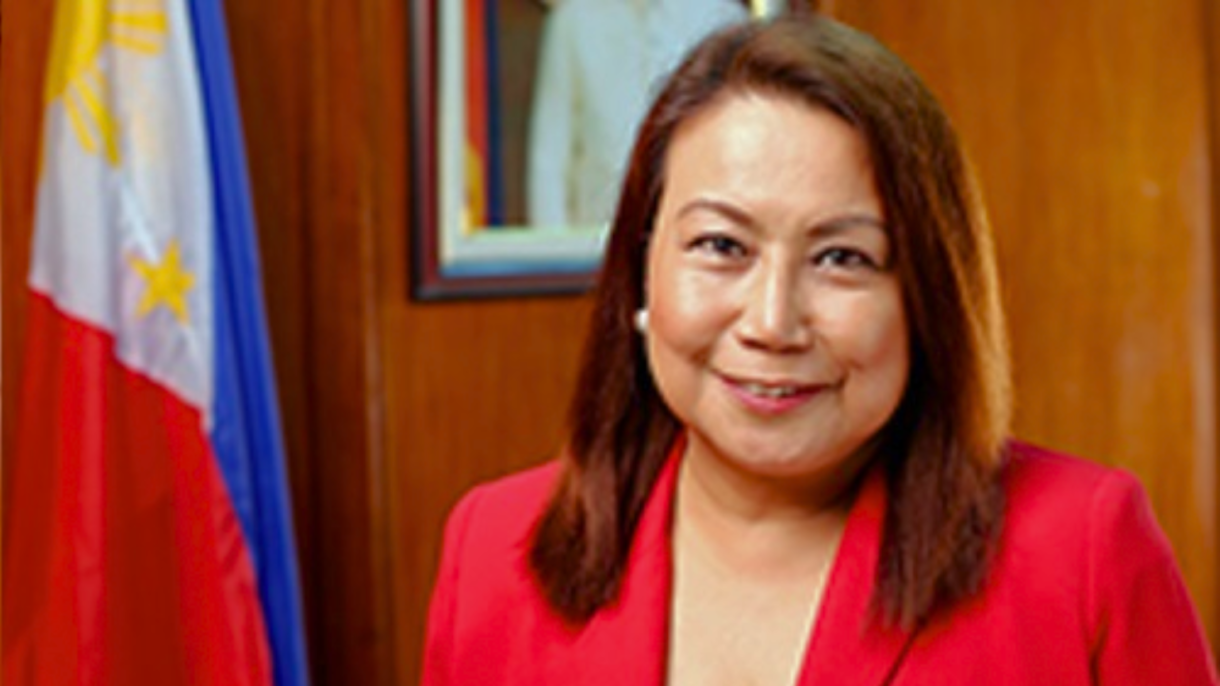
PHLPost welcomes you to the Asia Pacific!
August 25, 2015
The Asia-Pacific region is rapidly changing and is now leading the world when it comes to e-commerce volumes. Today more and more companies are looking to establish themselves in the ASEAN market, making the World Mail & Express Asia Pacific 2015 event the perfect place to develop business relationships, expand networks and capitalize on the booming e-commerce industry in the area.
This year the World Mail & Express Asia Pacific Conference is hosted by PHLPost and arrives in Manila from 19 – 21 October.
Post & Parcel speaks to PHLPost Post Master General, Maria Josefina Dela Cruz, to find out what the event means to the newly-rebranded organisation, the connections it is hoping to make and the experiences it is keen to share with industry leaders across the world.
Why was PHLPost keen to host the conference this year?
PMG: Hosting the biggest conference of leaders and top executives in the global courier industry brings honour and prestige to PHLPost as this serves as a testament that the international community recognizes the capability and resources of the corporation to provide a conducive atmosphere for discussion and business. We at PHLPost take pride in welcoming the leaders in the postal industry to the World Mail & Express Asia Pacific event in Manila.
How does PHLPost hope to benefit from the event?
PMG: As a host and participant, PHLPost aims to use the occasion to promote its developments and demonstrate what it can offer to spur active participation in the supply chain management required in the flourishing industry of the cross border e-commerce. We hope to establish more connections, foster deeper partnerships, learn new business solutions, and adopt best practices to bolster our reengineering efforts in the corporation.
What unique postal challenges does PHLPost face?
PMG: We consider the issue on “de minimis” as the unique postal challenge confronting PHLPost. While we accept that countries do have varying thresholds for the imposition of duties and taxes, here in the Philippines, anything beyond PHP15 or less than US$1 (current exchange rate is US$1 : PHP43) is taxable. This supposed streamlined border for clearance and customs duties and other taxes has been a burden especially on the part of the micro, small, and medium sized enterprises that ventured into the e-commerce sector. Certainly, there is a need to expedite the enactment of proposed amendments in the Philippine Tariffs and Customs Law, and this includes increasing to a substantial amount of the de minimis, as this will result in the reduction on the customs compliance cost; instead, it will accelerate the delivery transactions of merchandise in favour of all the entrepreneurs, also the players in the courier business.
How is the theme for the event ” Championing e-commerce: creating new supply chains” relevant to you?
PMG: The conference theme couldn’t be more appropriate as championing e-commerce is at the core of our rebranding efforts. PHLPost aspires to bury the poor image of the corporation, and instead make way for an image of relevancy and sustainability. Today’s postal services are no longer defined by stamps, snail mail, and paper-based money order as PHLPost scales-up to express, logistics and warehousing, electronic remittance, and cross-border e-commerce.
Championing e-commerce means that the country’s government owned and controlled corporation that is PHLPost is now stepping up its role as an indispensable player in providing business solutions for micro, small and medium sized enterprises, allowing trades to move freely and easily across borders. Further, championing e-commerce will significantly drive revenue growth and profitability—areas that are crucial in achieving the Corporation’s thrust to contribute to the national treasury.
PHLPost has extensive domestic acceptance, distribution, and delivery network, as well as its worldwide mail linkages. The organisation also remains committed to bridging the gap between individuals, families, communities, businesses, and organizations. Despite the advent of modern modes of communication, PHLPost will continue to be relevant and competitive both in the domestic and international realms because it will be able to harness modern technology for greater transparency and efficient service delivery.
Why is the event important to PHLPost?
PMG: This event reinforces the relevance of PHLPost in the value chain. Committed to last mile delivery, PHLPost continues to play a vital role in the nation’s development. Modern technology, which some had previously perceived as a threat to the post’s survival, has become the corporation’s reliable partner in improving its delivery efficiency.
What can attendees learn from PHLPost?
PMG: If there’s one thing that the other posts can learn from PHLPost, it’s our program for people management, as we consider our human resources as the biggest asset of the corporation. PHLPost has embarked on a transformative reengineering program to increase efficiency, improve transparency and accountability, and strengthen operations within the corporation. By strengthening the organization, the current leadership hopes to build a sustainable business culture that provides service excellence to the Filipino people.
As a host, PHLPost hopes to showcase its reengineering experience as a model in empowering the postal employees. The corporation began sowing seeds of trust within the postal community to make the employees feel passionate about their jobs and committed to the organization. We modernized our facilities, automated our systems, implemented a refleeting program, and up scaled our products and services — all these investments to enable long-term value creation. As a result, we have already reversed the unfavourable condition in 2011, and continue to improve performance indicators.
Source: Post & Parcel

